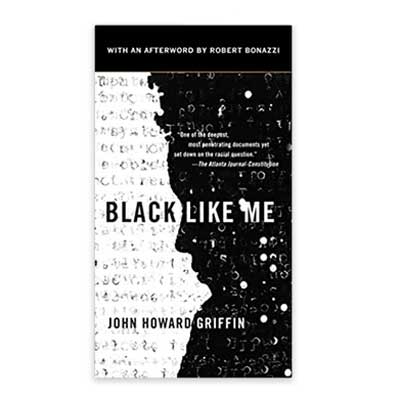“I learned a strange thing — that in a jumble of unintelligible talk the word “nigger” leaps out with electric clarity. You always hear it and always it stings. And always it casts the person using it into a category of brute, ignorance.” John Howard Griffin, Black Like Me, November 8 excerpt
I recently re-read this powerful book entitled Black Like Me by John Howard Griffin. I remember reading it in high school, back in the early 90’s but really all I remembered was that he was a white man, a journalist, and he had chemically darkened his skin with the help of a dermatologist in order to experience the life of a black man. Every other detail was brand new to me and I have to say reading this book has shaken me to my very core as a white woman, as a United States citizen and as a spouse to a mulatto woman, born in 1965, in North Carolina.
“Walking along Dryades, through the ghetto, I realized that every informed man with whom I had spoken, in the intimate freedom of colored bond, had acknowledged a double problem for the Negro. First, the discrimination against him. Second, and almost more grievous, his discrimination against himself; his contempt for the blackness that he associates with his suffering; his willingness to sabotage his fellow Negroes because they are part of the blackness he has found so painful.” John Howard Griffin, Black Like Me, November 10-12 excerpt
Just as the SS encouraged other Jewish prisoners to abuse and take ownership over other Jewish prisoners during the Holocaust, some white people encouraged black people to abuse each other and most of the rest of the white people stood by and let it happen. I have often read about black culture, slave culture. I know it was common for slaves to abuse their children bitterly because they felt it was better that they beat their children then the master do it. In many families this is still in place, this post slavery trauma response that hasn’t been altered by time because of lots of reasons, all individual to each family. And not just because of lack of education or change in some black families but the lack of education and change in some white families; the existence of white supremacy that is so accepted that we don’t realize it is there.
In his November 14 excerpt, Griffin travels to Mississippi, against the advice of his new friends who have been very helpful to his change over to his new life. Recently the FBI had delivered evidence that proved a black man had been kidnapped and lynched in Hattiesburg, Mississippi, yet the Pearl River County Grand Jury failed to return any indictments or even consider the provided information.
Although Griffin found it relatively pleasant in New Orleans, at the train/bus station, his experience was one of pure hatred. The woman who sold his ticket to him, almost would not. She gave him the “hate stare” and when she did finally change his $10 bill, she threw his change and ticket at him, instead of handing it to him or placing it on the counter. Although the depot was large and empty, except for a porter and one white man, that man also gave him the “hate stare” making it obvious he was not welcome. The porter, who was black, showed him to the crowded, COLORED CAFE located behind the depot.
While traveling into Mississippi the black people seemed to become more caring, as if they were a buffer for the hatred from the white folks, this was a common occurrence everywhere Griffin went. When the bus would stop, the driver would allow the white people off but not the black people for bathroom breaks. Griffen noted that farm animals are given more grace. As they came closer to Hattiesburg, a woman was happy to warn Griffen to never look at a white woman, “look at the ground or to the side.” He wasn’t even to look at a picture of a woman at the movie theater or in a magazine.
Another black man advised him of a safe place to stay and offered to check in with him in the morning. Griffen was impressed by his kindness but he was scared. He was intimidated by the white boys driving by and yelling at him and other people on the street. The squalor of the room, the fear he felt, it was so great that he felt he couldn’t even write a letter to his white wife and this led him to reach out to a journalist friend that lived in the area that he thought might take him in.
The journalist was glad to have him. His viewpoint in his writings left he and his family isolated and he enjoyed having Griffen help him with his writing, but Griffen could not rest there, and he couldn’t do what he set out to do there. Before his friend brought him back to New Orleans, they visited Dillard University (November 16). As kind as his friend was to him, he was different around “real” black people: “Did you ever see such a damn beautiful campus for a bunch of niggers? They’re getting uppityer and uppiter.” This viewpoint was shockingly different from the abolitionist and advocate he portrayed in his work and personal life, working for equal voting rights.
This way of making an exception for a black person you know but not the entire race is another way that prejudice can hide in plain sight and I think it still thrives today. I believe fear comes in all colors and if we aren’t willing to look at it and call it what it is, we will never become enlightened.We will remain afraid, small and unable to change.
“The whites frequently walk into colored restrooms, Scotch-tape these notices to the wall. This man offered his services free to any Negro woman over 20, offered to pay, on an ascending scale, from $2 for a nineteen-year-old girl, up to $7.50 for a fourteen-year-old and more for perversion dates. He gave a contact point for later in the evening and urged any Negro man who wanted to earn $5 for himself to find him a date within this price category…To the Negro who sees the element of the white man’s nature — and he sees it much more often than any other — the white man’s comments about the Negro’s alleged “immorality” rings maidenly hollow.” John Howard Griffin, Black Like Me, November 16 excerpt
Believe it or not, this is not the most deplorable example of degrading actions that white men portrayed against black men and women, yet it explains how a black women could feel she is only worthy as a sex object and how men are supposed to use and abuse that part of her, instead of honoring and respecting her. I know that so many people have grown beyond this. I do know that 1960 happened 62 years ago and I see a lot of growth that I am thankful for but I also see where we haven’t changed too. Areas were poverty and crime prevail women and men still violate and dishonor each other every day. It is like the self-hatred has been passed down through generations and gotten stronger.
As Griffen traveled through the South, he often hitchhiked. This was common during this time and he was most often picked up by white men who wanted to fill their sexual deviant minds with questions they thought were acceptable to ask this man because he was black or COLORED as was the term used at the time. One young college man was surprised that Griffen could tell him that black people were parents just like white people and they wanted their children to grow up healthy and remain virgins as long as possible just like white parents. It impressed him, but not enough to stop him from asking Griffen to show himself to him. Another man became violent and threatened to kill him when Griffen would not answer his vile questions.
Money was another way that black people were controlled. Gas taxes paid by all were used to maintain beaches black people were not allowed to use. Stores would offer credit to black families, yet it seemed like fees were always added so that they could never be paid off so the families were always so poor they could barely afford to improve their homes or clothe their children.
One man that picked up Griffen, brought him home with him, he was positive that there was nowhere safe for him to stay for the night. He let him know that he only had 2 bedrooms and 6 children but he could have the floor and it was clean. Griffen had bought a loaf of bread and a few candy bars before he was picked up. When they reached the man’s home Griffen met the man’s wife and children. She was happy to meet him and happy all her children were healthy, she mentioned that many families had children that were blind or maimed in some way, Her husband was a little embarrassed in his meager home and plain dinner of beans with no meat but Griffen praised his beautiful and obviously healthy children until the father beamed. He offered the bread and they enjoyed a feast. They sliced up the candy bars for dessert and were thankful. This experience really made Griffen appreciate how hard this man worked for his family.
Within a week Griffen could no longer handle being black all the time and stopped taking the medication that was keeping him dark. He applied a dye to his skin when he was prepared to enter society as a black man that would wash off when he had had enough. So much of society was shut off to him as a black man. He spent most of his time walking, worrying about what bench or park he could sit in, what bathroom he could use, what fountain he could drink from, if there was a colored cafe nearby where he could get a bite to eat. All of these things were few and far between. In more religious areas, whites were sometimes more gentle but there was always a line that Griffen had to be aware of in order to keep the peace. There were no jobs he could have. They were either taken or being weeded out by communities that were purposely making it impossible for black people to survive there before the equality laws were passed. White men said these things to him like they were telling him the prices of a bushel of apples.
When Griffen returned home, he was overjoyed to see his wife and 3 children but even his publisher offered him an out. He did not have to publish anything about his adventure. But Griffen was committed to sharing what he had learned. With that came what he was expecting. Hatred. Threats. Quiet gratitude. In the end his family and his parents had to move from their Texas home to New Mexico to be free from the violent calls and threats but Griffen remained faithful to his truth and he had gained respect from many people of all colors.
In no way have I shared the entire story. I think you should read this book. I think you will absorb it differently than I did. I am very glad I walked into Storyboard Delights on Karen’s arm last month and found it on the used book shelf. This book has helped me understand a few things about my wife, things that I always loved but made me really respect her even more for, about the way she responds to people. Her humility and servant attitude are skin deep and I know that some of it is learned behavior from being a mixed girl child of the south. Not just black, not just white, not just Native American…with those freckles and too much pride. I know she has lived through trauma and when she is too tired to hide it, I meet a girl that has been hurt. I have a friend that moved to Arkansas and she often tells me I should move there and how much I would love it. I don’t think I would, but more importantly, and I finally told her this: my wife is a mulatto female that worked really hard to leave the south, and although I would like to visit, I don’t ever see us moving there. I think she finally understood.
I live in a town that is 87% white. In Longview, Washington 10% of the population is mixed and all other races are less than 2%. I have been thinking about this for a few days. Actually I have been thinking about this off and on for quite some time because my wife has eluded to it a couple times. I have come to the conclusion that there are lots of reasons people of color would move here. I am glad they did. When I was growing up here, I bet Longview was more like 97% white and I enjoy seeing the diversity. I like seeing change. I made a comment that I don’t care what color a person is, but it is more than that. it isn’t that I don’t care about a person’s color, because what I care about is the person’s heart. I love to learn about their culture, beliefs and who they are. I do think dark skin is more beautiful than white skin but my wife says that is just a preference…I think she is correct.
Black Like Me by John Howard Griffin showed me that there were many types of people: hateful people, enlightened people, and complacent people and they come in all colors. I don’t care what color you are, what I really care about is how open you are to becoming enlightened; letting go of fear and embracing love, peace and freedom. I am not perfect. I can say I probably have a mix of all three characteristics in me, but I hope I am more enlightened than I used to be. I do know that next time someone asks me if I am prejudiced, instead of being defensive or fighting with them, I am willing to saying, “Let me consider that. Thank you for bringing that to my attention.”
Buy your own copy of Black Like Me by John Howard Griffin on Amazon
~
Feel free to leave your comments below!
My name is Summer. That is how you can call me. I hope that I am a blessing to you. I am not perfect. I will fall again. But I am forgiven.
Do you know Jesus? Do want the Holy Spirit to fill you and give you understanding and salvation? Ask Him. Want someone to pray with you? Contact me.
If you would like to know Jesus as your friend, but want to make this amazing commitment by yourself please pray something like this:
Thank you Jesus that You are the Son of God, the God that created heaven and earth. Thank you Jesus that You came to earth in the form of a man so that You would be able to empathize with my humanity. Thank You that You did this in order to fulfill the promises You made at the foundation of the world.
I realize that I am a sinner and do things that hurt myself and keep myself away from you. Thank You that You died for my sins so that You could defeat death and bring me into Your life. Please forgive me.
I ask You to be Lord of my life. I ask you to heal my hurts and show me what my new life, empowered by You looks like. Thank You for Your mercy.




 Please wait...
Please wait...

